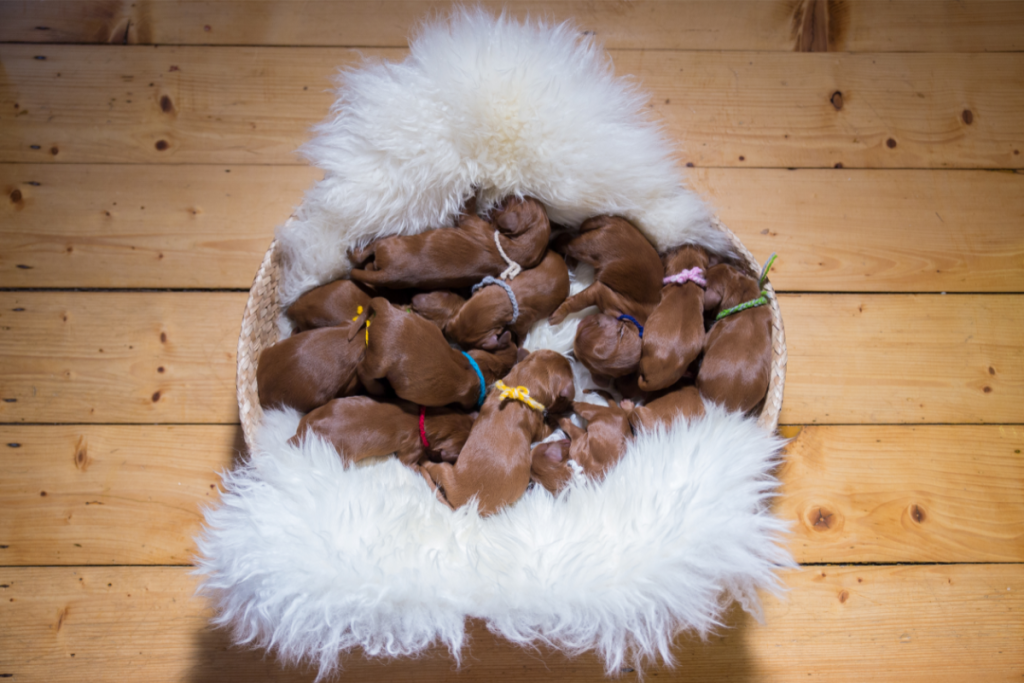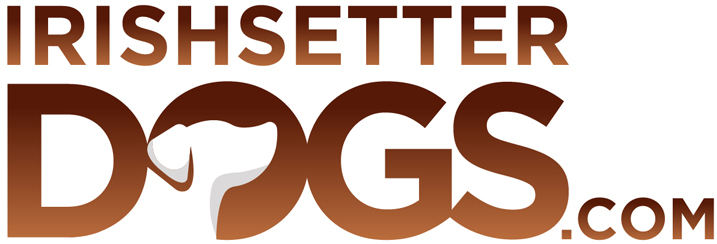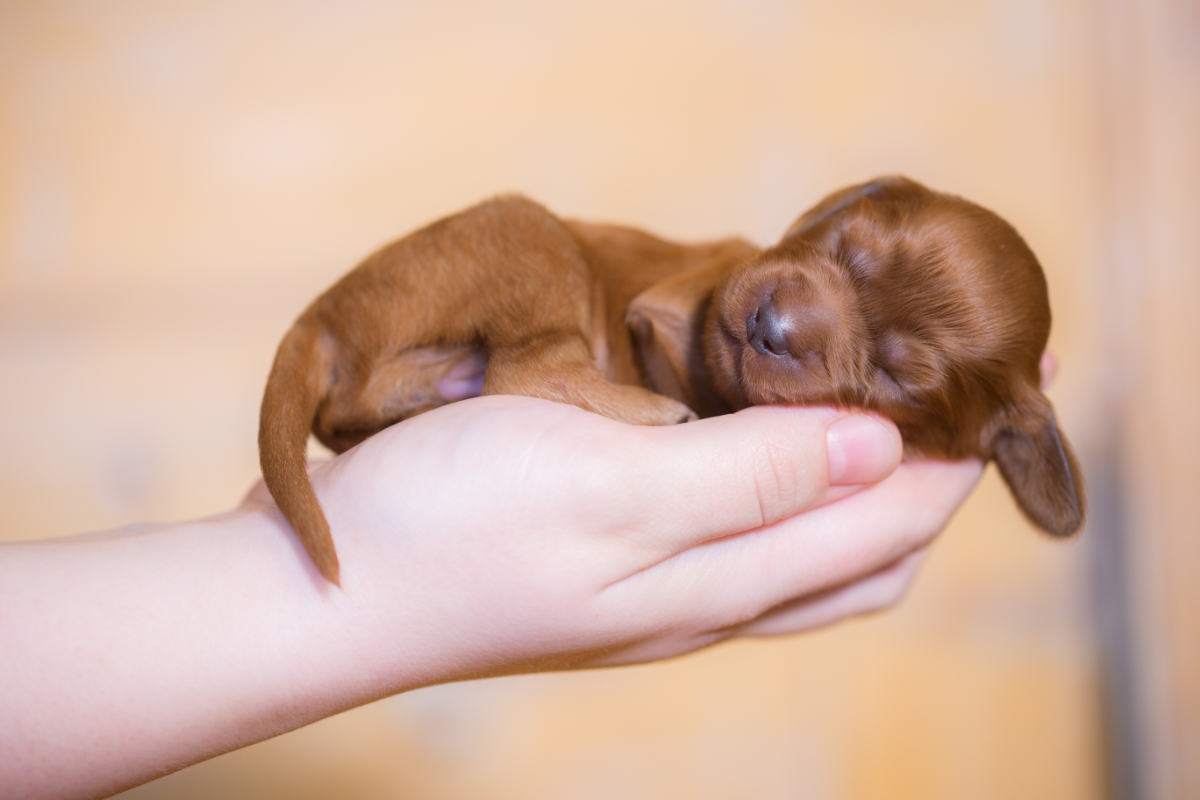Getting an Irish setter puppy is thrilling and pleasant. It might be challenging for experienced pet owners to care for newborn Irish setter pups. So, how to take care of newborn Irish setter puppies? You must feed them properly, keep them warm and secure, take them to the vet often, and love them.
Rest assured we’ll help you. We’ll explain every critical stage of caring for newborn Irish setter pups in the following section. Learn all about caring for these lovely tiny critters instantly.
Preparing for the Arrival of Newborn Irish Setter Puppies

So, you’ve decided to bring home newborn Irish setter puppies. But before the arrival of your little bundle of joy, there are a few things you need to prepare for. First, we should create a safe and comfortable environment, and here’s how you do it:
🐾Puppy-proofing the Living Space
Before bringing home your new Irish Setter puppies, it’s essential to puppy-proof your living space to prevent any accidents or mishaps. Remove potential hazards such as electrical cords, toxic plants, and small objects that could be swallowed. Make sure to secure cabinets, block off stairways, and cover exposed wires to create a safe environment for your curious little ones.
🐾Providing a Warm and Quiet Area
Newborn puppies need a warm and quiet area to feel secure and comfortable. Set up a cozy whelping box or a designated puppy area with soft bedding and blankets. This space should avoid excessive noise and foot traffic, allowing the puppies to rest and relax without disruptions.
Now, let’s move on to the next essential step – gathering necessary supplies.
🐾Gathering Essential Supplies
These are some of the basic supplies you’ll need to have on hand before your Irish Setter puppies arrive:
👉Puppy Bedding and Blankets
Invest in soft and washable bedding for your Irish Setter puppies. Opt for materials that are gentle on their delicate skin and easy to clean. Provide enough blankets to keep them warm and cozy during their early days of life.
👉Nutrient-Rich Puppy Formula
During the first few weeks, newborn puppies require a specialized formula for nourishment. Consult with your veterinarian to choose a high-quality, nutrient-rich puppy formula. Follow their guidance on feeding schedules and portion sizes to ensure optimal growth and development.
👉Feeding Bottles and Nipples
In order to feed the newborn puppies, you will need a set of feeding bottles and nipples specifically designed for puppies. These should be sterilized before each use to maintain cleanliness and prevent potential infections. Remember to consult with your veterinarian on the proper technique for bottle-feeding to ensure the puppies receive proper nutrition.
👉Thermometer for Monitoring Temperature
Maintaining the right temperature is crucial for newborn puppies, as they are unable to regulate their body heat effectively. Invest in a reliable thermometer to monitor the temperature in their living area. Ensure that it remains between 85-90 degrees Fahrenheit (29-32 degrees Celsius) during the first week, gradually decreasing as they grow older.
Preparing for the arrival of newborn Irish Setter puppies involves creating a safe and comfortable environment and gathering essential supplies.
Birth and Initial Care for Irish Setter Puppies
Now is the time to prepare for the arrival of your Irish Setter puppies. There will be a lot to do, from cleaning and disinfecting their living area to purchasing supplies such as bedding, food, and feeding bottles. You should also have a plan for when the mother goes into labor and what steps to take immediately after the birth.
⟶Understanding the Birth Process
Irish Setter mothers exhibit certain signs that indicate they are going into labor. These include restlessness, nesting behavior, loss of appetite, pacing, and possibly vaginal discharge. Observing these signs can help you anticipate the arrival of the puppies and be prepared for the birthing process.
Although most Irish Setter mothers are capable of giving birth without assistance, there are occasions when intervention may be necessary. It is important to recognize signs of distress or complications, such as prolonged labor, intense pain, or the mother being unable to expel a puppy. In such cases, it is crucial to seek veterinary assistance immediately to ensure the mother’s and her puppies’ safety.
⟶Assisting with the Birth
Before the birth, gather all necessary equipment, including clean towels, scissors, and dental floss or thread for tying off the umbilical cord. Sterilizing these items is crucial to prevent any potential infections. Boiling them in water or using a sterilizing solution recommended by your veterinarian will ensure they are free from harmful bacteria.
Once the puppies are born, it is essential to ensure that each one takes their first breath. If a puppy does not start breathing immediately, gently rub them with a clean towel to stimulate their respiratory system. If this doesn’t work, you can hold the puppy upside down for a few seconds to clear any mucus or fluids from their airways. Remember to be gentle and seek veterinary assistance if necessary.
⟶Immediate Post-Birth Care
After the puppies are born, be careful not to separate the puppies from their mother for too long during this process to ensure proper bonding.
Proper attachment to the mother’s nipples for nursing is crucial for the puppies’ health and development. Ensure each puppy latches onto the mother’s nipple within the first hour after birth. If you notice any difficulties, such as weak suckling or the mother rejecting a puppy, seek veterinary advice immediately to address any potential issues.
How to Take Care of Newborn Irish Setter Puppies

Congrats! You now have a litter of adorable Irish Setter puppies. As a responsible breeder or pet owner, you must ensure that these puppies receive the best care possible in their early days of life. Here are some tips on how to take care of newborn Irish Setter puppies:
☑Mother’s Milk vs. Puppy Formula
It’s essential to assess the mother’s milk production to determine if it is sufficient to nourish all the puppies adequately. Observe the puppies after nursing sessions to ensure they appear content and satisfied. If you notice signs of hunger or if the mother’s milk production seems insufficient, it may be necessary to supplement their diet with puppy formula.
☑Choosing a High-Quality Puppy Formula
When selecting a puppy formula, opt for a high-quality product specially formulated for newborn puppies. Look for formulas that mimic the composition of mother’s milk as closely as possible. These formulas are designed to provide the necessary nutrients, vitamins, and minerals for puppies’ growth and development.
☑Feeding Frequency and Volume Guidelines
Newborn Irish Setter puppies have tiny stomachs and need frequent feedings. Aim to feed them every two to three hours during the first few weeks of life. Start by offering small amounts of formula or mother’s milk, around 1-2 tablespoons per feeding, and gradually increase the volume as the puppies grow and their appetite increases.
☑Monitoring Weight Gain and Growth
Regularly monitor the puppies’ weight gain to ensure they are thriving. Weigh them at least once a week and keep track of their progress. A steady increase in weight is a positive sign of proper nutrition and growth. Consult your veterinarian for guidance if you notice any significant deviations or concerns.
Taking care of newborn Irish Setter puppies involves providing them with proper nutrition and nurturing. Whether opting for mother’s milk or puppy formula, it’s vital to assess the mother’s milk production and choose a high-quality formula if necessary.
Newborn Irish Setter Puppies Health Monitoring
It doesn’t stop with providing the right nutrition for newborn Irish Setter puppies. It’s also essential to keep a close eye on their overall health and well-being. Here are some tips for monitoring the health of your adorable little ones:
🔴Vaccinations and Preventive Care
Scheduling regular checkups with a veterinarian is crucial for the overall health of your newborn Irish Setter puppies. Vaccinations play a vital role in protecting them from various diseases, and your veterinarian will provide a vaccination schedule tailored to their specific needs. Additionally, preventive care measures such as deworming and flea prevention may be recommended to ensure their well-being.
🔴Identifying and Addressing Health Issues
Regular veterinary checkups also allow for the early detection and treatment of any health issues that may arise. Your veterinarian will thoroughly examine the puppies’ overall health and development. They can identify abnormalities or concerns and provide appropriate treatment or guidance to address them promptly.
🔴Monitoring Temperature, Heart Rate, and Respiration
Monitoring vital signs is essential to ensuring the health and well-being of newborn Irish Setter puppies. Use a digital thermometer to measure their temperature rectally, ensuring it falls within the normal range of 97.5°F to 99.5°F (36.4°C to 37.5°C).
Additionally, monitor their heart rate by gently touching their chest and counting the beats per minute. The normal heart rate for newborn puppies ranges from 200 to 300 beats per minute. Lastly, observe their respiration rate by counting the breaths they take in one minute, typically around 15 to 40 breaths.
🔴Recognizing Signs of Distress or Illness
It’s important to pay close attention to any signs of distress or illness in newborn Irish Setter puppies. These can include lethargy, loss of appetite, abnormal behavior, diarrhea, vomiting, or difficulty breathing. If you notice any of these symptoms or anything else concerning, contact your veterinarian immediately for further evaluation and guidance.
Regular health monitoring is vital for the well-being of newborn Irish Setter puppies. By scheduling regular checkups with a veterinarian, you can ensure they receive necessary vaccinations, preventive care, and timely treatment for any health issues.
Socialization and Stimulation

Socialization and stimulation are vital aspects of raising a well-rounded Irish Setter puppy. Early interactions with littermates and humans play a significant role in their development and future behavior.
🐾Importance of Sibling Bonding
Allowing Irish Setter puppies to interact with their littermates is crucial for social development. They learn important lessons through sibling bonding, such as communication, bite inhibition, and appropriate play behavior. These interactions lay the foundation for their future interactions with other dogs and can help prevent behavioral issues later in life.
🐾Facilitating Gentle Play and Exploration
Encourage gentle play and exploration among the littermates. This allows them to develop critical social skills, such as sharing, taking turns, and resolving conflicts. Provide a safe and supervised environment for their playtime, ensuring it remains positive and free from excessive roughness. This early interaction fosters healthy socialization and contributes to their overall well-being.
🐾Introducing Gentle Handling from Humans
Early human interaction is essential for building trust and forming a strong bond with your Irish Setter puppy. Start by introducing gentle handling from a young age, such as gentle petting and holding them securely but softly. It helps them become comfortable with human touch and builds a positive association with human presence.
🐾Exposing Puppies to Various Environments
To ensure your Irish Setter puppy becomes well-adjusted and confident, expose them to various environments, sounds, sights, and smells. Gradually introduce them to new experiences, such as car rides, visits to parks, meeting new people, and encountering different animals. This exposure helps prevent fear and anxiety later in life, enabling them to adapt to various situations easily.
Promoting interactions with littermates and facilitating gentle play encourages healthy social skills and prevents future behavioral issues.
Newborn Irish Setter Puppies Grooming and Hygiene
Below, we will explore the importance of brushing and cleaning their coat, nail trimming and ear care, introducing puppy potty training, and maintaining a clean living area for your adorable Irish Setter puppies.
🐕Brushing and Cleaning
Regular brushing and cleaning are vital for keeping your Irish Setter puppies’ coats healthy and free from tangles and matting. Use a soft brush or comb designed for their fur type to remove any loose hair and debris gently. This keeps their coat looking shiny, helps distribute natural oils, and promotes healthy skin. Additionally, wipe their paws and belly with a damp cloth after outdoor play to remove dirt and prevent irritation.
🐕Nail Trimming and Ear Care
Trimming your Irish Setter puppies’ nails is essential to their grooming routine. Use nail clippers designed for dogs and avoid cutting into them quickly, which can cause bleeding and pain. Regularly inspect and clean their ears using a damp cotton ball or a veterinarian-recommended ear cleaner. Be gentle and avoid inserting anything deep into their ear canal to prevent injury.
🐕Introducing Puppy Potty Training
Puppy potty training is crucial for maintaining good hygiene and preventing accidents in your home. Start by designating a specific area for them to do their business, such as a puppy pad or a designated outdoor spot. Take them to this area frequently, especially after meals or naps, and praise them when they are eliminated in the right place. Consistency, positive reinforcement, and patience are key to potty training your Irish Setter puppies.
🐕Cleaning and Maintaining the Living Area
Keeping the living area of your Irish Setter puppies clean and hygienic is essential for their health and comfort. Regularly clean their bedding, toys, and any other items they encounter. Use pet-safe cleaning products to disinfect their living space and prevent the buildup of bacteria or odors. Additionally, ensure that the area is free from potential hazards, such as small objects they could swallow or toxic plants.
Maintaining proper grooming and hygiene practices for your newborn Irish Setter puppies is crucial for their overall health and well-being.
Weaning and Transitioning Irish Setter Puppies

As your Irish Setter puppies grow, it’s important to guide them through the weaning and transitioning process. This stage marks a significant milestone in their development as they transition from their mother’s milk to solid food and gradually become independent.
❕Gradual Introduction to High-Quality Puppy Food
When introducing solid food to your Irish Setter puppies, it’s crucial to choose high-quality puppy food that meets their nutritional needs. Look for a brand specifically formulated for large breed puppies, ensuring it contains essential nutrients such as protein, carbohydrates, and vitamins. Consult your veterinarian for recommendations on the appropriate type and quantity of food to feed your puppies during this transition period.
❕Monitoring Appetite and Digestive Health
Monitor your Irish Setter puppies’ appetite and digestive health during the weaning process. Start by mixing a small amount of puppy food with warm water or formula to create a soft gruel. Gradually increase the amount of food while decreasing the liquid until they solely eat solid food. Observe their appetite, ensuring they are eating enough to sustain their growth. Additionally, keep an eye on their stool consistency, looking for any signs of digestive upset such as diarrhea or vomiting. If you notice any concerns, consult with your veterinarian for guidance.
❕Encouraging Independence
As your Irish Setter puppies grow, it’s essential to encourage their independence and prepare them for life without their littermates. Gradually introduce them to spending time alone, starting with short periods and gradually increasing the duration. Provide them with safe and engaging toys and activities to occupy them during these independent moments. It helps them develop confidence and adaptability, preparing them for a smooth transition to independent living.
❕Preparing for Separation from Littermates
While it can be challenging, preparing your Irish Setter puppies for separation from their littermates is necessary for their individual growth. Arrange playdates with other friendly dogs or enroll them in supervised puppy socialization classes to help them become comfortable interacting with unfamiliar dogs. This exposure to new social environments will aid their development and reduce the likelihood of separation anxiety when they eventually leave their littermates.
With your nurturing guidance, your Irish Setter puppies will thrive and embark on a healthy journey towards adulthood.
Frequently Asked Questions
How do I know if the mother is producing enough milk, and when should I consider using puppy formula?
Monitoring the mother’s milk production is important to ensure the puppies have enough nutrition. Look for signs that the puppies are gaining weight steadily and are content after nursing. If you notice that a puppy is not gaining weight or seems unsatisfied after feeding, it may be necessary to supplement with puppy formula. Consult your veterinarian for guidance on the appropriate timing and method of introducing formula.
How can I monitor the health of the puppies and identify signs of illness?
Regularly monitoring the puppies’ health is essential. Keep an eye out for any changes in behavior, such as decreased appetite, lethargy, diarrhea, or vomiting. Check their eyes, nose, and gums for any signs of discharge or discoloration. Additionally, pay attention to their coat condition and overall body condition. If you notice any concerning symptoms, it’s best to consult your veterinarian promptly for a proper diagnosis and treatment.
When should I start the weaning process, introducing solid food to the puppies?
The weaning process typically starts around 3-4 weeks of age. At this stage, you can begin introducing soft, mashed puppy food alongside the mother’s milk. Start with small amounts and gradually increase the portion size as the puppies become more comfortable with solid food. It’s important to monitor their response to the food and ensure they can chew and swallow it properly. Consult with your veterinarian for specific guidance based on the individual needs of your puppies.
How can I encourage healthy bathroom habits in the puppies during the early stages of life?
Establishing healthy bathroom habits is crucial during the early stages of a puppy’s life. Take the puppies outside frequently, especially after meals and naps, to a designated potty area. Use consistent verbal cues, such as “go potty,” to help them associate the command with the desired action. Reward them with praise or a small treat when they are eliminated in the appropriate spot. Be patient and consistent with the training process, as it takes time for puppies to develop bladder and bowel control.
How can I handle the challenges of introducing the puppies to a new home environment?
Introducing the puppies to a new home environment can be overwhelming for them. Gradually introduce them to different parts of the house, allowing them to explore at their own pace. Create a safe and comfortable space for them with their bed, toys, and food/water bowls. Stick to a consistent routine for feeding, playtime, and potty breaks to provide stability. Offer plenty of positive reinforcement, love, and attention to help them feel secure during this transition period.
Can I spay or neuter the puppies, and at what age is it recommended?
Spaying or neutering your puppies is generally recommended to prevent unwanted pregnancy and certain health issues. The ideal age for spaying or neutering can vary depending on the breed and individual circumstances. It’s best to consult with your veterinarian, who can assess the specific needs of your puppies and provide guidance on the appropriate timing for the procedure. Your veterinarian will consider factors such as the puppies’ overall health, development, and breed-specific considerations.
Final Words
Taking care of newborn Irish Setter puppies is a responsibility that shouldn’t be taken lightly. It requires patience, love, and commitment. However, the payoff is huge. Watching these adorable little creatures develop into intelligent and loyal companions is a rewarding experience that can’t be matched. Make sure to keep them clean, warm, and fed.
Be attentive to their needs and give them lots of love and affection. With proper care, these little pups will flourish into strong, healthy dogs that will fill your life with endless joy and companionship. So, if you’re considering taking on the challenge of raising newborn Irish Setter puppies, go ahead and take the leap. You won’t regret it.

